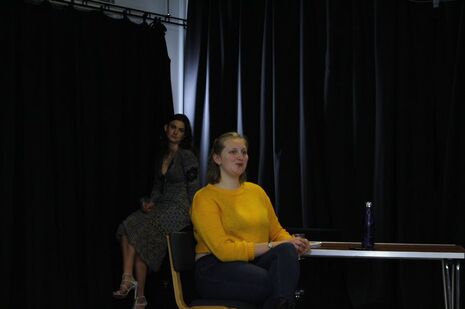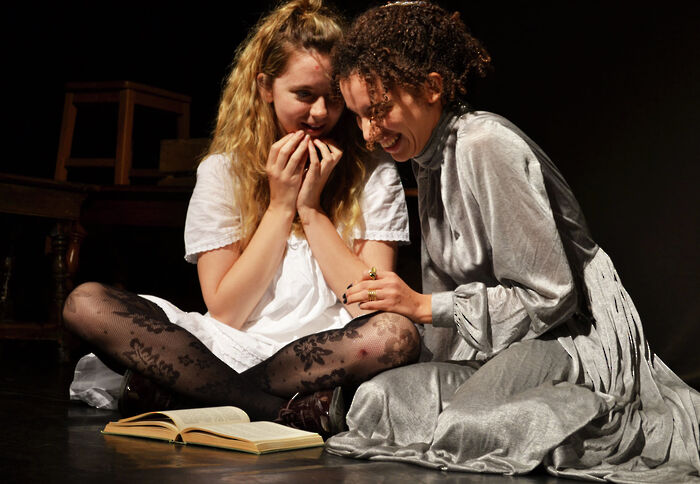Parisienne shifts our spotlights
Cadence Ware considers the motives behind her new play, which brings backstage to centre stage and women to the fore in its unashamed exploration of female sexuality.

Dressing rooms are strange places. Private, yet only a stone’s throw from a stage; personal, but occupied by a different actor every few days, or weeks, or months. Almost every actor has a stand-out dressing room memory, whether they be hilarious, or devastating, or simply embarrassing. Dressing rooms can be elaborate and expensive, or dusty cupboards in the bowels of the theatre. They can be shared with a cast or taken over entirely by one actor. Yet what all these various spaces have in common is their distance from the audience – very few, when watching Les Miserables in the West End, will think about what goes on backstage.
Parisienne inverts this distance by making the stage into a dressing room (or the dressing room into the stage). Ashley, the protagonist, is supposedly ‘off-stage’ yet she remains scrutinised by an audience who have invaded her world, even as she seems to invite them to watch her. It is impossible for her to escape judgement, impossible to for her to truly stop acting. The play, fundamentally, is a play about relationships – not just the relationships between characters but those between actor and audience, between artist and subject, and between Ashley and herself. It is this last relationship around which the action is structured. We’ve all done it – wondered whether our lives would have been radically different if we’d got pooled to a different college, picked a different course, or hadn’t dated that person with the abominable taste in jumpers and coffee for six months. It’s fun to make up alternative narrative in our heads…until it becomes scary. This is what the show explores: is it helpful to try and re-write the past?
“Parisienne is simply a play about women, or rather one woman.”
People often ask me what was my motivation for writing the script. Bizarrely, and as much of a cliché as it sounds (which, given that the play spends a lot of time exploring the nature of 'cliché’, seems vaguely appropriate), it almost seemed to write itself, on the beanbags of the English Faculty Library, when I should have been working on my essay. At least in part, this was because I was so passionate, and still am, about the importance of the story I wanted to tell; a play that is unashamed in its discussion of female sexuality. It can only address one tiny part of this incredibly complex thing, of course – there would never be space for me to delve into every facet of it in a show a little over an hour long – but I wanted at least to deconstruct the abstract notion of female ‘purity’. Ashley is a woman who talks about sex, and who faces the judgements not just from men but from other women. It’s a feminist play, but insofar as it focuses on the stories and experience of women, rather than because it makes a particular political point. There are many wonderful political feminist plays out there saying extremely important things; I leave that to the experts. Parisienne is simply a play about women, or rather one woman. The male characters exist, in a reversal of traditional stage narratives, simply to illuminate and act as supporting roles to the women.
A lot of people, perhaps naturally, might assume that when someone has written a play, they have a clear artistic vision of what it’s about, can tell you all the patterns they’ve built into the script and the significance of all the references, and generally are going to have all the answers to everything script-related. However, something I have learned very quickly, and which becomes even more apparent in the rehearsal room, is that a writer only ever owns half a character. The other half is there for the actor to interpret, because so much is left unsaid by the script – particularly in this play, which constantly emphasises the role of interpretation in theatre, and leaves the audience to decide which narrative to believe. Some of the most fun parts of rehearsals for me have been filling in the bits that I left out.
What has really struck me during the rehearsal process is how the contrast is not between what is real and not real, but between what is stylised and what is naturalistic. As these things come together, the impact of the play, its humour and its sadness and its hope, becomes ever more apparent. The cast have made me want to laugh, cry and everything in between in rehearsal, and I can’t wait to see what they all bring to the stage on opening night.
Parisienne will be showing at the Pembroke New Cellars at 9pm, Tuesday 12th - Saturday 16th November.
 Features / Are you more yourself at Cambridge or away from it? 27 January 2026
Features / Are you more yourself at Cambridge or away from it? 27 January 2026 News / Vigil held for tenth anniversary of PhD student’s death28 January 2026
News / Vigil held for tenth anniversary of PhD student’s death28 January 2026 Interviews / Lord Leggatt on becoming a Supreme Court Justice21 January 2026
Interviews / Lord Leggatt on becoming a Supreme Court Justice21 January 2026 News / Reform candidate retracts claim of being Cambridge alum 26 January 2026
News / Reform candidate retracts claim of being Cambridge alum 26 January 2026 Comment / How Cambridge Made Me Lose My Faith26 January 2026
Comment / How Cambridge Made Me Lose My Faith26 January 2026










